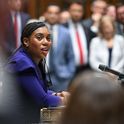The country should currently be in the throes of a contest between two political heavyweights vying to demonstrate who has the better policies and personality to lead the UK through what threatens to be a very difficult few years. Instead, we have the unedifying spectacle of two ambitious opportunists striving to win the votes of a tiny sub-section of the electorate, a fair proportion of whom, at least in the estimation of one former Tory leader, have previously been more sympathetic to Ukip than to moderate conservatism. Hence, within days of Rishi Sunak and Liz Truss being chosen as the candidates to go before the members of the Conservative Party, they were fighting to show which of them would be tougher on immigration.
Neither of them can be unaware of the desperate shortage of immigrant labour which is now hitting so many sectors of the economy, but facts are irrelevant in this sordid tussle. It is simply a short battle to win the support of a group of people who would probably opt for Boris Johnson to be prime minister for another term if they could have his name added to the ballot paper (and there is a campaign underway which demands his inclusion).
This is an electorate which favoured Priti Patel as one of the stars of the cabinet, until she gradually slipped down the rankings as asylum seekers continued to take the dreadful risks involved in trying to cross the English Channel. Shamelessly seeking to appeal to those who had been impressed by Patel’s pitiless rhetoric, Sunak and Truss are now set on showing they can talk even tougher. Neither has yet revived the idea of wave machines to send the boats back to France, but they are blowing this particular dog whistle with even more puff than that apparatus would have required. Both promise to double down on Rwanda-style schemes, and Sunak has dreamed up the idea of imprisoning unwanted asylum seekers in floating detention centres. These recommissioned cruise ships would, presumably, have first to be stripped of any soft touches such as televisions or games rooms in order not to inflame the Daily Mail’s ire!
In this contest, the role of the Daily Mail and Paul Dacre, the all-powerful editor-in-chief of its parent group, DMG Media, has been pernicious. They backed Truss from the start and, since positive reasons for making the foreign secretary prime minister were not overwhelming, took the easier route of attacking her opponents. Penny Mordaunt was virtually disembowelled in print because of her alleged “woke” stance on gender recognition. Rishi Sunak’s wealth has provided the Mail with plentiful ammunition for its attack. Hatred of perceived wealthy privilege is a core value of DMG, despite its majority shareholder being the fourth Viscount Rothermere and Dacre having sent his two sons to Eton.
Sunak cannot rewrite his pre-political past, which includes winning a place at Winchester, making a hedge fund fortune and then marrying into a much larger inheritance. If he had been considering the Mail’s attitudes in his electioneering, though, he might have swapped the Prada suede loafers for something a little more sensible—and cheaper—on his recent visit to a Teesside building site.
More sensibly, Sunak is refusing to bow to the clamour from the Mail and the Telegraph for instant tax cuts. This promise of massive tax cuts remains Truss’s trump card in the truly Trumpian low to which UK politics has sunk. Yet what both candidates should know is that the country is in no position to splash the cash around. As the outgoing chief secretary to the Treasury, Liam Byrne, so memorably wrote in the note he left his successor in May 2010, “I’m afraid there is no money. Kind regards—and good luck.”
Sunak knows how bad things are because up to the point that—depending on one’s interpretation of events—he resigned in a principled (if somewhat belated) protest over Johnson’s lies/staged an attempted coup with the aim of catapulting himself into No 10, he was in charge of the nation’s finances. Truss might also be expected to have a handle on the numbers, having been chief secretary to the treasury between June 2017 and July 2019, but perhaps she has failed to notice that since then, a combination of Covid and Brexit has depleted the coffers and hammered the country’s prospects. Besides, she knows that Conservative Party members see low taxes as an inherent precondition of good government, an unquestionable positive that will benefit them and should be a vote-winner at the next general election. Some of them may recall, and might even have paid, the top rate of income tax of 75 per cent which prevailed in the early 1970s, under the leadership of Edward Heath—but then they probably dismiss Heath as never having been a proper Tory but, whisper it, “a pro-European.”
Sunak has already demonstrated his enthusiasm for keeping his family tax bill to a minimum and is now anxious to be seen as a tax-cutter but a more responsible one than his opponent. So he is pledging “tax cuts you can believe in,” a meaningless phrase, particularly for an electorate whose belief in the wonders of tax cuts is as unshakable as Creationists’ conviction that Darwin was deluded. If he really did have the single ambition of being able to put “prime minister” on his CV, no matter the cost to the country, he could have promised to make everyone richer from the day he won office in the knowledge that someone else would before long be picking up the tab. Because what both would-be prime ministers must surely realise is that the chances of the winner still being in post after the next election are minimal.
Keir Starmer may not be the most scintillating of politicians but elections tend to be lost rather than won—and the Conservative Party has surely done enough already to ensure that it is not returned to power in 2024, even allowing for some serendipitous boundary changes. Both Truss and Sunak have been party to Johnson’s calamitous government, remaining supportive as draconian legislation was enacted, international obligations waived aside and parliament and the public regularly told untruths. Even if that were not sufficient to ensure that the electorate felt it was time for a change, then the state of the economy in 2024 will be sufficiently grim to have those presiding over it shown the door.
In June this year, the interest charge on the UK’s government debt hit £19.4bn, £10.3bn more than in June the previous year and the highest-ever figure since records began in 1997. Worse still, much of that debt is linked to inflation and that is now in double figures. Those in search of a silver lining will point out that inflation increases tax revenues as well as interest bills, but that stops being the case if businesses are suffering and the word from a host of chief executives is that the outlook for profits is dire.
Pollyanna-like Liz Truss may cling to the mantra that tax cuts lead to increased revenues because businesses thrive and people with more cash tend to spend it, but this virtuous circle is far from proven. A report from Brookings found that tax cuts almost inevitably led to increased deficits, with a consequent negative effect. More recently, the CBI argued that, while it would not argue against the reversal of Sunak’s planned increase in corporation tax, far more important to growth prospects was the continuation of incentives for capital investment.
Even if tax cuts did eventually provide the boost that their advocates claim, in the short term they have to be funded and if that is not to be by borrowing yet more increasingly expensive money, then it has to be through cuts to public services. On this side of the equation, Truss has been understandably silent. What cannot have escaped her or Sunak, as anyone who regularly travels by train, uses the NHS or has children in state schools experiences, is that public services are in pressing need of more money—and fast. She may enjoy mimicking Margaret Thatcher, but can it be that Truss secretly dreams of presiding over a winter of discontent that makes 1978/79 seem like a picnic in the sun?
The rail unions are providing just a gentle taster for what could lie in store as inflation stokes the pent-up demand for real-terms increases in wages. And the problems are not only in the public sector. “Levelling up” may have been nothing more than a marketing ploy designed to appeal to the Red Wall seats where people felt ignored and were persuaded that Boris Johnson had their interests at heart—as if he ever had anyone’s interests at heart apart from his own. There is a real need for levelling up, though, and it is not about geographical divides but serious financial injections.
The extent of poverty in the UK is clear for even the most blinkered of politicians to see. Unemployment may be low but demand for foodbanks has rocketed, with many of the clients being families with parents who are in work. During the pandemic, increased government support helped lower the levels of child poverty, but the Resolution Foundation now estimates that, in the current financial year, the number of people in the UK living in absolute poverty will rise by 1.3m, including 500,000 children. That is not a statistic of which any presiding PM could be proud.
Part of the problem is the income inequalities that the Resolution Foundation has been highlighting for years. Business could have alleviated some of the pain by sharing the spoils a little more equally, but has proved highly reluctant to do so. That, however, in not an issue into which a Conservative government would wish to wade, particularly one led by a free marketer such as Truss or Sunak.
Whichever of them is crowned on 5th September, our next prime minister will have plenty of other problems awaiting them, not least those of the Brexit which both now embrace. The issue of the Northern Ireland Protocol remains pressing. Johnson may think he can stave off a Lords’ rebellion simply by creating dozens of malleable peers but there are two parties to the treaty and the EU seems set on playing hardball. Truss’s belligerent approach to diplomacy is unlikely to win her any favours. The “to-do” list goes on, including the issue of the war in Ukraine and the energy crisis. Unforeseen events may be what eventually scuppers prime ministers, but perhaps what is most surprising about the leadership contest the UK is currently witnessing is that anyone should even want to take on the job.













